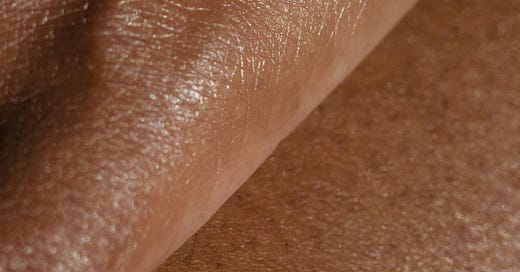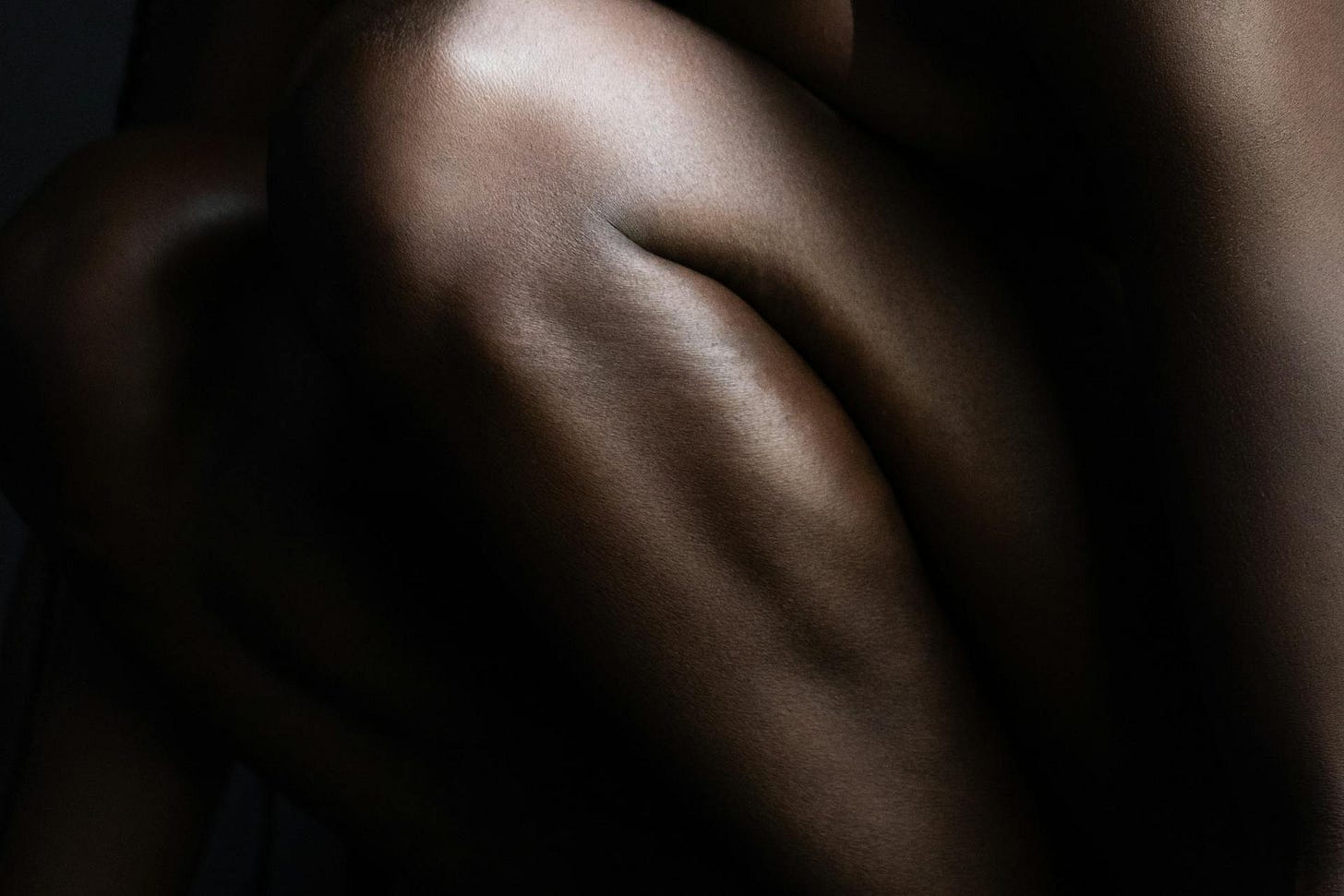i try to stride along beautiful and unfazed with my new mantra of i am enough, but i only get so far. in my peripheral vision there she limps behind me at all times. wounded and afraid always. her slow heaviness always. her unchecked bandages always. i cannot clear enough distance from her. so instead i turn around. i stare at a face i couldn’t even glance at in the mirror. i see a body i could not expose to a single soul. years of hatred. and i give her my arm. and we walk slowly together. what else can we do?
For years, I had body dysmorphia. Of course, I didn’t actually know this for most of that time; I thought it was completely normal to hate myself as a brown woman in England. Something felt so inherently abnormal about my sheer existence in most of the spaces I had to occupy. It took me decades to realize that the dysmorphia was actually due to co-habiting my body with the sickness of empire, trying to contort and erase my features according to its ever-changing and unattainable needs, in a vain attempt to fulfil my own. The need to belong. To be loved. To be seen as viable, attractive, valuable. To absorb and assimilate with whiteness to the point where I didn’t know where it ended and I began.
I was born in London; the heart of empire, and raised in the white working class northern town of Barnsley. Growing up in the 90’s was rough as one of the only Indian kids there, and we regularly received casually-flung racist comments as we walked down the street or stood outside our own home. My mother was the only brown woman I saw beyond my own reflection, and when she died, the house was filled with white women and their petite features. I began to feel like an alien; my larger nose and tall, slim body feeling awkwardly out of place, with no daily reminders of its normality or acceptability. No affirmations in the media, on the TV, or on the streets. No words of comfort from those around me, only racial curiosity or belittlement.
Dysmorphia is not something that develops overnight. I believe it creeps in over time, slowly planting seeds within the cracks created by the unnatural demands of empire. In the deliberate fractures. Its inorganic beauty standards are drip-fed through the ethers, slowly soaking into our reflections and distorting the shape of us. The sound of us. The solidity and validity of us. The insidious voice that starts speaking to us silently, telling us that to be loved, we have to be hairless, like them. Small-nosed, like them. Blonde, like them. And this voice starts sounding scarily like our own, so much so that it can take years to untangle the two. The original from the invasion. The truth from the lie.
It takes a huge amount of loving vigilance and compassion to hold ourselves as we release empire from our body and learn to love its lines, its colour, the way it holds the weight of so many ancestral stories. To stand straight, spine unburdened from humiliation. To face the brutal honesty of what happened to us, and how we lost ourselves so utterly and completely for so many years.
Many of us are still on this journey, and I’d love to say I have reached the end of it. I nearly have. But to live within empire is to face the reality of its impact every day and to commit to remembering when sometimes all you see and feel is your own erasure. The erasure of your people. Even if it lies behind their blonde highlights, their nose jobs and their shrinking of themselves. Their altered accents. Their bleached skin. And much more insidious is how it now hides behind their declarations of self-love and their celebration of darker skin as they find other, more subtle ways to assimilate and proximate themselves to whiteness.
For many people of the diaspora, we were forged in foreign terrains which we never asked to find ourselves within. We were stolen, manipulated, scaremongered or shipped out of our motherlands, only to find ourselves in the heart of where it all began. We had to chisel our own identities out of seemingly thin air, creating something so precarious and fragile that it could shatter at a moment’s notice. A sideways glance. The P word. The N word. The C word. Not getting the job. Being rejected. Being overlooked. We had to build and rebuild ourselves amongst the ever-changing backdrop of colonial beauty standards and colourism. We were only as acceptable as these current standards deemed us to be at any given time. As the adverts and the films and the magazines permitted us to be.
As a woman of colour, I spent many years only seeing myself through the white male gaze. The absolute gods of my existence. It was an incredibly miserable existence, too. Nothing was ever enough; whether in relationship with them or not, whether desired or not, the hungry ghost of dysmorphia ensured that I was never enough for myself. There was always some way I could improve, and if I just did that, I’d feel better. As you can predict, it never happened. I never felt better, even in my twenties - the supposed peak of attractiveness. It could never be satiated, this hungry ghost. Because it was never meant to be. The dangling carrot of physical perfection was a way to torture myself internally, so that I was doing empire’s work without them having to lift a finger. The constant exoticizing mixed with outright racism was thoroughly confusing. To be sexually desired by them was social currency, and I conflated being wanted with being respected. Oh, how wrong I was - and I know I’m not the only one.
And so here we find ourselves. In this global moment of reckoning, of release and reconciliation. Of the veils of empire slowly being lifted to reveal the tiny wizard-of-Oz like white man hiding behind the curtain. So many of us are realizing, ah. It was this all along. I gave myself away, I betrayed myself for this. But we didn’t betray ourselves willingly. We did it out of a desperate sort of love; a self-preservation in the cruelty of absolute erasure and degradation. This is what we must remember as we heal. To look lovingly and gently upon ourselves as we walk hand in hand with the self-made ghoul; the part of us we exiled into the underworld, terrified that they’d be seen in their fullness and destroyed. We did it out of love. And we will welcome them back out of love.
I speak about leadership. But self-leadership and responsibility is the cornerstone of all else, and the work to disentangle the dysmorphia must start within us. There will be no-one coming to save us, magically healing all of our wounds as surely as they created them. No, it begins with us. A gentle correction of the internal voice. A longer, slower glance in the mirror. Celebrating the small wins. Dance. Song. Movement. Ritual. Laughter. Connection. Intimacy. These are all remedies for empire. Remembering that we are of the Earth, and how perfect that is. How a forest of wildflowers is beautiful because each flower is so uniquely special yet adds to the wild entirety. A sense of harmony that is formed by the absolute opposite of homogeneity. A sense of wonder that so much diversity can exist on such a small area of forest floor or sea bed. Just as it is with us. No more AI-ifying and codifying our features to deny ourselves for the sake of belonging to a culture which relentlessly eats itself alive and the rest of us, too. It has to stop somewhere. And it can stop with us.
We may think that we leave our dysmorphia at home, or that no-one can hear the quiet voice in our heads. But we carry it with us everywhere. It walks into every room, every space with us. It breathes through us and it gathers energy when we feed it with comparison, self-deprecation and abandonment. It alters the way we move, the way we speak, the way we tighten the sinews of our neck and jaw. It lives in our fascia and tissue. It nestles into our bones. The way we hold back on our full smile, our full gait, of the entirety of our essence spilling through our every gesture. We hold it in. We hold it in. We hold it all in. And it shows.
I don’t want any person of colour to see themselves as lesser than, or unacceptable in the face of white expectations of beauty. Not now. Not after all this time. And if I want this for them, I have to want it for myself. I have to lead with this, no matter how embarrassing or vulnerable it may be to speak about this. And over the years, I have noticed the impacts of healing. The way my immediate thought is ‘you’re beautiful’ when I look in the mirror, rather than cringing at my own reflection. The way I hold my head a bit higher, and walk with more confidence. The way I laugh a little louder or sarcastically roll my eyes a little higher. The gestures that make me, me. And it’s in the letting go of needing others to approve of me, to deem me as worthy of belonging. It’s in the communities where I see black and brown skin in abundance; a dazzling display of features which reflect the many landscapes, cultures and ancestries which brought us all to life.
It’s in everything that we ever denied, all that we buried, tried to cut or burn away. It’s where the scars are, where the dark hair grows, uninhibited. It’s where our nose speaks for itself, without us having to say anything. It’s in our proud ownership of it all. Of welcoming it back into the sacred, where it always belonged.
For leaders of colour who wish to dismantle empire by healing the empire within themselves, I offer consultancy sessions to provide gentle guidance through the process. The website is currently under construction so please contact me if you wish to work together.
For those navigating their own journey with grief and would like a guide through the underworld of death, grief and loss, you may find my poetry book Half Woman Half Grief beneficial.
Click here to explore my full collection of talks, podcasts, books and articles.














Share this post